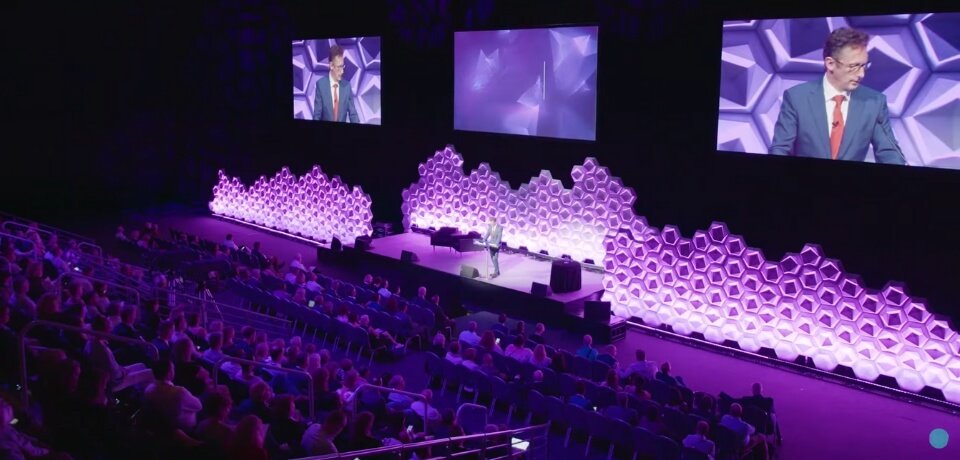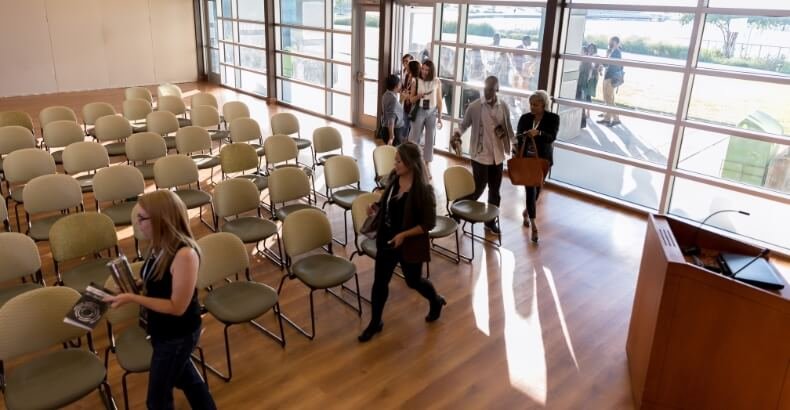Planning a successful business conference is no small feat, but it can be incredibly rewarding. Whether you’re aiming to establish connections, share insights, or showcase innovations, the right approach makes all the difference. So, how do you set up a business conference that leaves a lasting impact?
First, start by defining your objectives and target audience. This will guide your decisions on venue, agenda, and speakers. Next, create a detailed timeline, ensuring you allocate time for logistics, marketing, and attendee engagement.
Finally, promote your conference effectively to maximize attendance and excitement. With careful planning and a clear vision, you can create an event that resonates with participants.
Ready to explore more? Continue reading to explore the essential steps for setting up your business conference.
What is the Purpose of a Business Conference?
A business conference serves multiple essential purposes, providing a platform for organizations to promote growth, collaboration, and innovation. From an organizer’s perspective, being aware of these key purposes is vital for creating a successful event.

Networking Opportunities
One of the primary goals of any business conference is to connect attendees. By bringing together professionals from various fields, organizers create an environment conducive to networking.
Participants can build relationships, share insights, and explore potential collaborations. These connections often lead to valuable partnerships that can greatly improve business prospects.
Knowledge Sharing
Conferences are excellent venues for knowledge transfer. Organizers create panels and presentations featuring industry leaders and experts who share the latest trends, best practices, and innovative ideas.
This not only helps attendees stay informed but also inspires them to implement new strategies within their own organizations.
Brand Visibility
For businesses, hosting or participating in a conference can improve brand recognition. An international business conference organizer can showcase their brand through sponsorship opportunities, speaking engagements, or promotional materials.
This visibility helps establish credibility and positions the brand as a thought leader in the industry.
Professional Development
Conferences often include workshops and training sessions aimed at skill development. Organizers design these programs to meet the needs of attendees, ensuring they leave with actionable insights that can be applied in their careers.
This focus on professional growth attracts participants eager to improve their expertise.
Market Insights
Organizing a conference allows businesses to gather valuable feedback directly from attendees. This real-time input can provide insights into market trends, customer preferences, and emerging challenges.
Being aware of these dynamics helps organizations refine their strategies and adapt to changing market conditions.
Motivation and Inspiration
Finally, conferences serve as a source of motivation. The energy of a well-organized event can invigorate attendees, inspiring them to pursue new ideas and challenges. Hearing success stories from peers can reignite passion and drive within teams.
The purpose of a business conference extends far beyond mere gathering; it’s about creating a vibrant ecosystem where professionals can connect, learn, and grow together. For organizers, these objectives are the foundation for a memorable and impactful event.
How Do You Set Up a Business Conference: A Step-By-Step Guide
Setting up a business conference needs strategic planning. And no wonder, the planning starts with defining what the organizers are looking forward to achieving from this arrangement.

We’re here to suggest to you the right ways to set up a business conference by providing a step-by-step guide. Being aware of how do you set up a business conference effectively is crucial for success. No matter, if you’ve already a good reputation in this field or newbie, this guide will come to your assistance any day.
What is the Conference Goal?
Setting up a clear goal will let you assess your achievement at the conference and work for the betterment of the upcoming events. The goal means setting a target that encourages one to work heart and soul until reaching the destination.
The goal can differ depending on whether it’s an international or local conference. Neither the target audience will be identical nor the event goal. International conferences mainly discuss the latest trends, exchange ideas, showcase research papers, etc.
Therefore, we can define a few conference goals.
- Exchange of innovative ideas and showcasing research papers
- Providing opportunities to the newcomers for their professional and personal development
- Earning revenue from ticket sales
- Uplifting the reputation of your company through successful arrangements
- Problem-solving inside the company.
No matter, what the reason is, each conference turns out into a meeting place for industry leaders, researchers, workers, and like-minded people in this field.
Meanwhile, the target audience changes drastically whenever the conference goal changes. For instance, researchers and graduates in this field are integral parts of the event when it’s an international business conference.
On the other hand, workers in the company are prioritized more in a local conference, which is arranged with the motif of solving any suddenly raised issues.
Isn’t Working in a Team Better than Working Alone?
You need a team to work with you to take your plan ahead. Assign your co-workers different responsibilities and notify them about their roles in the project.
Only some people are equally capable of handling everything in the project. So, assigning duties according to their field of expertise makes the overall task more convenient. Also, the successful execution of a huge plan needs teamwork.
- The completion of the entire project becomes more convenient
- Workers can work comfortably in their field of expertise
- Distribution of tasks in teams releases the pressure from a single head
- Everyone related to the project remains accountable for their work
- It’s comparatively easy to keep track of the work progress.
Meanwhile, using a project management tool like Trello, HubSpot or Cvnet can make the overall procedure a lot more convenient. These tools are dedicated to keeping track of the work virtually.
Keeping track of the work allows you to mark the progress in different fields of the project. Thus, the members are bound to finish their jobs perfectly within the allotted time.
Members can communicate virtually to get to know any issues, which is another reason that encourages the use of these tools.
Why Selecting a Suitable Location is Important?
A suitable location is the base of any successful conference. Wondering how? It is the place where several attendees will gather with the identical purpose of acquiring knowledge and expertise from industry professionals.
The event location must be easily accessible for attendees coming from anywhere in the world. Moreover, the conference is directly connected with the selection of the venue.
You need to follow a few criteria while selecting the location.
- Choose famous cities for the location
- A place that is easily accessible from the airport for foreign attendees
- The venue must not have any security issues
- A spacious room to accommodate the participants comfortably
- Having a parking area is a must
- Availability of quality catering service
- Interrupted WiFi, sound system, and projector.
Meanwhile, the job is not done yet because a perfect location can become useless just because of an imperfect date. Never fix a date that clashes with another program on the same day.
Moreover, it’s suggested that events on holidays, or vacations are never a good decision because people usually love spending those times with their family and loved ones.
Try having the last day of the conference on the weekend, which allows participants to think of visiting the locality and explore new things.
Can You Plan Without a Proper Budget?
It’s impossible to give your plan a concrete shape without proper budgeting for the conference arrangement. Budgeting for the event is key as it gives a clear idea of the spending in different sections of the event.
For instance, if the venue selection budget is already specified, you can never go beyond that margin. It ultimately leads to proper planning without having any shortage of money. So, while planning a business conference, establishing a clear budget is crucial.
Meanwhile, the entire event budget depends on a few specific fields.
- Venue cost including other facilities
- Speaker fees
- Catering service cost
- Healthy budget for marketing and promotion.
However, the team working on the financial side of the project must assess their expected earnings from the ticket sales. This will allow the team to decide what is the perfect budget for this event.
The amount of revenue you expect to earn from the event can be a way to assess how much you want to spend. Lack of budgeting can cause severe issues in the entire arrangement.
How to Reach the Target Audience?
One of the most important tasks of the entire planning period is to identify the target audience and invite them to attend your conference. The second one falls under the category of event promotion, which is the only way to ensure maximum attendee participation.
After the event theme and goals are decided, it’s possible to identify the target audience. However, reaching them can be tiresome if you don’t move systematically.
- Run both free and paid promotions on social media platforms
- Create interest in like-minded participants by asking them for opinions regarding the conference in the community groups
- Add a detailed agenda on the promotion page
- Personalized emails to reach the expected audience
- Decorate the website with glimpses and best presentations from the previous events.
An agenda is a way to inform the expected attendees of what will be included in the upcoming conference. This appears as an ideal way to arouse interest in the attendees to join the event.
Moreover, having the success stories on the website of the previous events allow the visitors to asses the organizer’s track record in this field. Researchers mostly look out for reputed organizers before registering for any such event.
Aren’t Quality Speakers the Spokesman of the Conference?
The keynote speakers have a huge responsibility to keep the attendees engaged in the conference room throughout the entire event. For this, speakers with a good track record in attending conferences are always trusted for this task.
While choosing a speaker for your event, consider a few things.
- Speakers with vast knowledge of the conference theme and topic
- Experienced speakers with a better track record
- Ability to connect to the audience and maintain eye contact
- Speakers who will share their expertise and valuable insights
- The selected speakers must be available on the conference day.
However, even if your selected speaker is available on the conference day, you need to fix the fee before finalizing anything. The total budget of the event decides how much the organizers are allowed to spend.
Meanwhile, attendees join a conference to gain insights and expertise from industry professionals. But they can never achieve their goals without having quality, and highly knowledgeable keynote speakers on the stage.
Moreover, knowledgeable speakers are always an important part of the event because they know what the attendees demand.
When to Define the Agenda?
The best time to define the conference agenda is before running any promotive program for the event. The reason is that adding the detailed agenda on the promotion page is a part of the marketing plan.
But it’s not possible until the agenda is 100% ready with all the required information in it. A perfect event agenda includes the following things.
- Conference name and a brief description of the theme
- Detailed info about the location
- Mentioning the date and time
- Included segments
- List of the keynote speakers
- Organizer’s name
- Organizer’s contact details for feedback.
One of the most important parts of this agenda is having the listing of the keynote speakers. Including reputed speakers’ names also makes the promotion lucrative and attracts more attendees.
However, having an agenda is necessary to provide an outline of the entire event to the participants. It does two things, where the first one is to decide whether it would be worth joining the event.
And the second one is providing enough time to prepare to attend the conference. Moreover, having contact details of the organizers allows the visitors on their site to share their opinions or any suggestions regarding the arrangement for the upcoming event.
Why a Simple Registration Process is Necessary?
You don’t want your participants to waste their valuable time or get confused while registering for the event. The only solution here is to have a dedicated conference website that offers a convenient registration process.
A few tips to maintain a user-friendly registration process.
- Create a dedicated conference website
- Have the registration link on the promotion page
- Allow participants to fill out the registration form with the necessary info
- Notify the registration approval through a personalized email.
This is the easiest way to get the registration done. Attendees may get irritated if the entire procedure is complicated and it won’t be a good sign for the rest of the event if the first impression is poor.
How Can You Ensure Maximum Attendees Engagement?
Registering for the event never suggests how engaging the attendees will be because it is part of the planning that is left out for the event day. Attendees with their maximum engagement give life to any program.
There are some tips for you to follow to ensure your audience’s engagement.
- Welcome your attendees with a conference package
- Include speakers who can easily interact with the audience
- Arrange panel discussions and workshops
- Allow them to ask questions to the speakers
- Group discussion with fellow participants
- Serve quality catering in the middle of the event.
The attendees will feel they are an integral part of this event when they can connect to the speakers. Attendee engagement is required starting from the Q&A session during keynote speeches to skill learning in the workshops.
Moreover, don’t keep your attendees hungry and tell them to enjoy the event. Serve quality catering to every participant sitting in the conference room to energize them.
Is There Any Value in the Follow-Up Segments?
The follow-up segments of a conference hold immense value for your upcoming events. Utilizing social media platforms to collect feedback is a good way to maintain a connection with your attendees.
It also suggests that the organizer respects the attendees’ opinions and tries to implement them in their events.
There are a few things you can do as an organizer to follow up after the conference ends.
- Arrange rewards for the attendees with the best presentation papers
- A photo session to reserve memories
- Collecting feedback regarding the entire arrangement
- Connect with the participants via various social media platforms.
Social media platforms like LinkedIn, Facebook, and Twitter are good mediums to maintain communication with your targeted audience.
Asking the audience about what type of conference they want next, or if there is any particular speaker they want to hear out can uplift the quality of the upcoming event.
What Are the Possible Challenges to Setting Up a Business Conference?
Setting up a business conference can be an exciting yet challenging task. Organizers often face various challenges that can complicate the planning process. Knowledge of these challenges and knowing how to tackle them is key to ensuring a successful event.

Budget Constraints
One of the most significant hurdles is managing the budget. Costs can quickly add up, from venue rental to catering and marketing. To address this, create a detailed budget early on and track all expenses.
Consider sponsorships or partnerships to offset costs and look for creative solutions, like local venues that may offer discounted rates.
Venue Selection
Choosing the right venue is crucial, yet it can be frustrating. Factors such as location, size, and amenities play a role in attendee satisfaction.
To reduce this, start your venue search well in advance and consider multiple options. Visiting potential venues can help you envision the layout and determine if they meet your needs.
Scheduling Conflicts
Finding a date that works for both speakers and attendees can be tricky. Conflicting events or holidays may limit your options.
To overcome this, survey potential attendees about their availability before finalizing the date. Flexibility is vital—be prepared to adjust your timeline if necessary.
Speaker Coordination
Securing knowledgeable and engaging speakers can pose a challenge. Many industry leaders have busy schedules and may not be available.
Reach out early and maintain clear communication. Offering flexible speaking slots or virtual participation can help attract a diverse range of speakers.
Marketing and Promotion
Effectively promoting your conference to attract attendees is crucial. Poor marketing can lead to low turnout.
Start your marketing campaign early, utilizing social media, email newsletters, and industry networks. Engaging content that highlights the benefits of attending can also drive interest.
Attendee Engagement
Keeping participants engaged throughout the conference can be challenging, especially with long sessions. Incorporating interactive elements is essential, and following the steps to organize a business conference effectively can help ensure that participants remain active.
Consider Q&A sessions, workshops, and networking opportunities. Gathering feedback during the event can help you adjust on the fly and keep your energy levels high.
Technology Issues
Technology can be both a blessing and a curse. From registration systems to audiovisual equipment, technical difficulties can arise.
Conduct thorough testing of all technology beforehand and have backup plans in place. Consider hiring technical support for the day of the event to troubleshoot any issues.
Post-Event Follow-Up
Lastly, many organizers overlook the importance of post-event activities. Gathering feedback and maintaining connections with attendees can be challenging but essential.
Send out surveys to collect insights and share highlights from the conference. This not only shows appreciation but also lays the groundwork for future events.
While setting up a business conference comes with its challenges, thorough planning, and effective communication can turn potential obstacles into manageable tasks.
How to Measure the Success of Your Business Conference?
Measuring the success of your business conference is crucial for determining its impact and planning future events. As an organizer, there are several key points to consider that will help you assess whether your goals were met and how attendees perceived the experience.

Attendance vs. Registration
One of the first indicators of success is the number of attendees compared to those who registered. A high participation rate can signal strong interest and effective marketing.
If attendance falls short, it’s worth analyzing factors like timing, location, and promotion methods to determine what might have deterred people from attending.
Attendee Engagement
Observing how engaged participants are during the conference can provide valuable insights. Look for signs such as participation in Q&A sessions, interaction during workshops, and networking activity.
Conducting real-time polls or surveys during the event can also assess engagement levels and identify which sessions connected the most with your audience.
Feedback and Surveys
Post-conference surveys are an invaluable tool for gathering direct feedback from attendees. Ask questions about their overall experience, specific sessions, and what they found most valuable.
This data not only helps assess satisfaction but also highlights areas for improvement. Aim for a mix of quantitative and qualitative questions to capture a comprehensive view.
Networking Outcomes
One of the primary purposes of a business conference is to provide networking opportunities. Measure how many connections attendees made and whether these relationships led to meaningful outcomes, such as partnerships or collaborations.
You can track this through follow-up surveys or by encouraging participants to share their networking successes.
Speaker and Session Ratings
Analyzing the performance of speakers and sessions is vital. Include questions in your feedback surveys that ask attendees to rate the effectiveness and relevance of each session.
This will help you understand what topics were most popular and which speakers made a lasting impression.
Social Media Engagement
Analyze your conference’s social media presence before, during, and after the event. Track metrics such as the number of posts, likes, shares, and comments related to your event.
A high level of online engagement can indicate that attendees were excited about the conference and willing to share their experiences.
Return on Investment (ROI)
Finally, calculating the ROI of your conference helps measure its financial success. Compare the total costs of organizing the event with the revenue generated, such as ticket sales and sponsorships.
This will give you a clear picture of whether the conference met your financial goals.
Measuring the success of your business conference involves analyzing attendance, engagement, feedback, networking outcomes, speaker effectiveness, social media engagement, and ROI. By taking a comprehensive approach to analysis, you can gain valuable insights that will inform your future events and maximize their overall impact.
Frequently Asked Questions
If you have further queries regarding how do you set up a business conference, this particular section might help you out.
How Long Does It Take to Plan a Business Conference?
Planning a business conference typically takes three to six months. However, the timeline can vary based on the event’s size and complexity. Starting early allows for thorough preparation and adjustments, ensuring a smoother experience for everyone involved.
Can I Organize a Business Conference on Atight Budget?
Yes, you can! With careful planning and prioritizing essential elements, it’s possible to host a successful conference without overspending. Focus on key areas like venue, speakers, and marketing while seeking sponsorships to help cover costs.
What is a Conference Layout?
A conference layout refers to the arrangement of seating, stages, and equipment within the event space. It’s designed to promote interaction, presentations, and networking. A well-thought-out layout improves the attendee experience, making it easier for participants to engage and connect throughout the conference.
What Makes a Conference Effective?
An effective conference combines clear objectives, engaging content, and meaningful networking opportunities. Quality speakers who communicate well with the audience, interactive sessions, and well-structured agendas all contribute. Plus, promoting a welcoming atmosphere encourages participation and collaboration, making the experience memorable for everyone involved.
Can I Host a Hybrid Conference?
Yes, hybrid conferences are increasingly popular. Combining in-person and virtual components allows you to reach a broader audience. This format provides flexibility for attendees, ensuring those unable to attend in person can still participate and benefit from the event.
Last Words
Setting up a successful business conference can be a transformative experience for both organizers and attendees. With the right planning and execution, you can create an event that promotes connections and inspires innovation. Knowing how to approach this task is the key.
So, how do you set up a business conference? By focusing on clear objectives, budgeting wisely, and engaging speakers, you lay the groundwork for an impactful event. Every detail matters, from the venue to the marketing strategy.
As you set sail on this exciting adventure, remember that your efforts can lead to lasting connections and invaluable insights. Get involved in the process, and you’ll not only host a memorable conference but also inspire everyone involved.